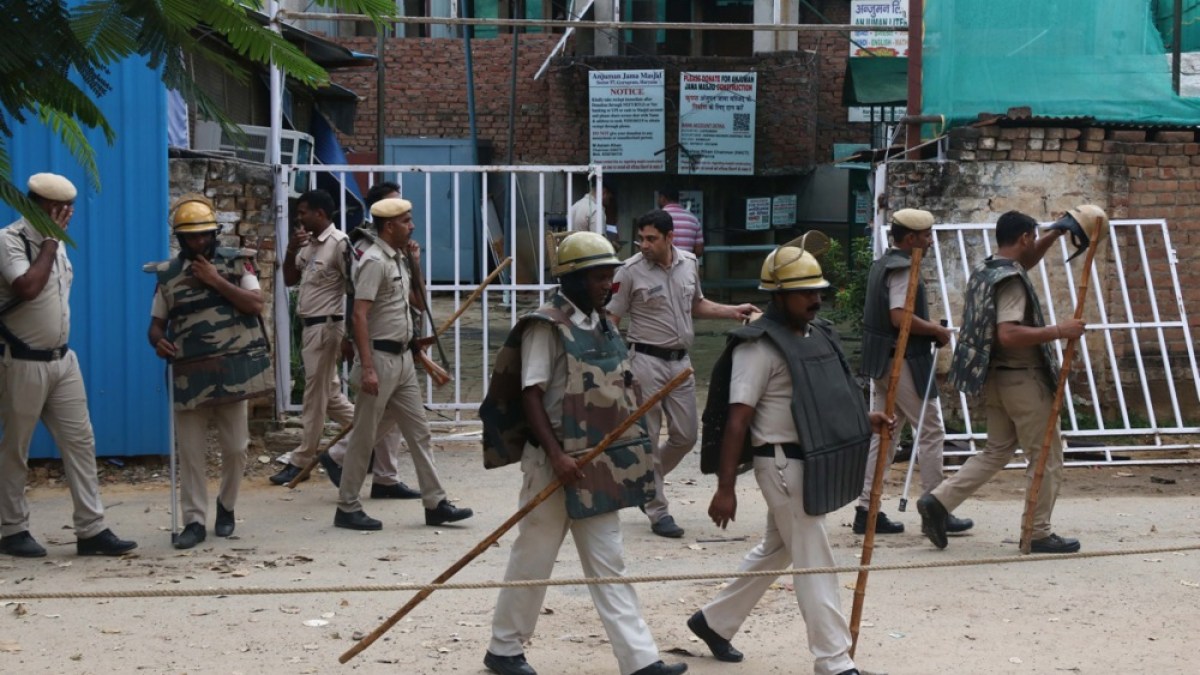Muslims in Haryana face calls for economic boycott after violence in Nuh
Hindu far-right organisations have called for an economic boycott of Muslim businesses and keeping Muslims out of villages after deadly communal violence broke out in India’s Haryana state.
Sectarian clashes erupted in Nuh district on July 31 after a religious procession by the Vishwa Hindu Parishad organisation reportedly came under attack, killing six people including two security guards.
The clashes soon spread to other districts. In Gurugram, a mosque was set on fire and its deputy imam, Mohammad Saad, 22, was killed.
So far, Haryana police arrested 312 people and took at least 106 into preventive detention, said Haryana Home Minister Anil Vij.
After the violence, there were protest calls by various Hindu groups.
At one demonstration in Nuh on August 2, in Hansi city of Hisar district, one speaker – Krishna Gurjar from Hindu far-right group Bajrang Dal – can be heard giving an ultimatum to local businesses to fire any Muslim employees working for them or face a boycott.
“Any shopkeeper who keeps any Muslim employed in his shop, then we will paste posters for their boycott outside their shops and will declare them traitors of our community,” Gurjar said via a loudspeaker in a rickshaw on a busy road with hundreds of followers.
“Only Hindu hawkers will be present here. If after two days any Muslim hawker is found, then whatever will happen to him only he will be responsible.”
Gurjar later told Al Jazeera, “I spoke about evicting outsider Muslims, such as Rohingyas.”
Asked if he wants Muslims of Hansi to leave the city, he replied, “Bajrang Dal’s aim is not to scare anyone. But Bajrang Dal won’t be scared itself and won’t let the Hindu community be scared.”
Lawyer Shahrukh Alam, who recently challenged hate speech before the courts, called the economic boycott calls against Muslims “part of a pattern of structural violence against them”.
“These demands somehow presume that Muslims have a lesser right to this country, and thus they can be ordered out of towns and districts. Moreover, such demands violate the integrity and security of the Indian nation. They are violative of guaranteed fundamental rights in the Indian Constitution,” said Alam.
Police officials are often seen walking with the Hindu activists at rallies, he said.
“Sometimes, police personnel can be seen observing these hateful rallies from the sidelines. To that end, lack of action from the police is also in breach of the Supreme Court’s orders,” said Alam.
In April 2023, the Supreme Court ordered India’s states to register incidents of hate speech without waiting for any complaints to be filed.
Hansi’s deputy superintendent of police, Virendar Sangwan, told Al Jazeera a case was registered against Gurjar and others for rioting and “promoting enmity between classes”.
“An investigation is under way,” said Sangwan.
At another demonstration on August 6 in Haryana’s Tigra village, Hindu protesters demanded the release of men arrested for killing the deputy imam of the Anjuman Jama mosque in Gurugram district.
“There are hundreds of Muslim men working in Gurugram as carpenters, barbers, vegetable vendors, mechanics, and cab drivers, and we have always supported them. But now we will ensure they don’t get any support from anywhere as they are responsible for disrupting peace in the city,” said Bajrang Dal’s Kulbhushan Bhardwaj at the gathering.
“Muslims should not be allowed to live or work in the city. We appeal to the people of the city not to rent out apartments or slums to them.”
A case was registered against Bhardwaj and others for promoting enmity between different groups. Al Jazeera contacted police officials in Gurugram but did not receive a response.
More than 50 village governing bodies in three districts – Mahendergarh, Rewari and Jhajjar- of Haryana issued statements on August 3 saying they decided to ban the entry of Muslim traders in their areas in the wake of “atrocities committed on Hindus in Nuh”.
Village heads wrote in the letters, which were seen by Al Jazeera, “No Muslim will be allowed to do any kind of business in the village such as selling things, buying cattle, begging.”
The move was supported by a prominent right-wing influencer who is followed by India’s Prime Minister Narendra Modi on Twitter.
Alam said the statements issued were against the law.
“The act of writing such letters is itself an offence and violence to the integrity of India, to the fraternity and equality of status promised in the Constitution. It is disappointing to me that authorities have chosen to not immediately prosecute the authors of such letters,” he said.
On 8 August, lawyer Kapil Sibal issued a petition to India’s Supreme Court against the calls for economic boycotts of Muslims.
A day later, unions gathered in Hisar district of Haryana with thousands of farmers to demonstrate.
“These letters banning the entry of Muslim traders are unconstitutional. I don’t think whole villages agree with this,” said farmer Suresh Koth who organised the protest.
He said leaders from all religions in the country, including Hindus, Muslims and Sikhs, were invited to discuss the situation.
“We gave a message that the rioters should be arrested and we want peace,” said Koth.




